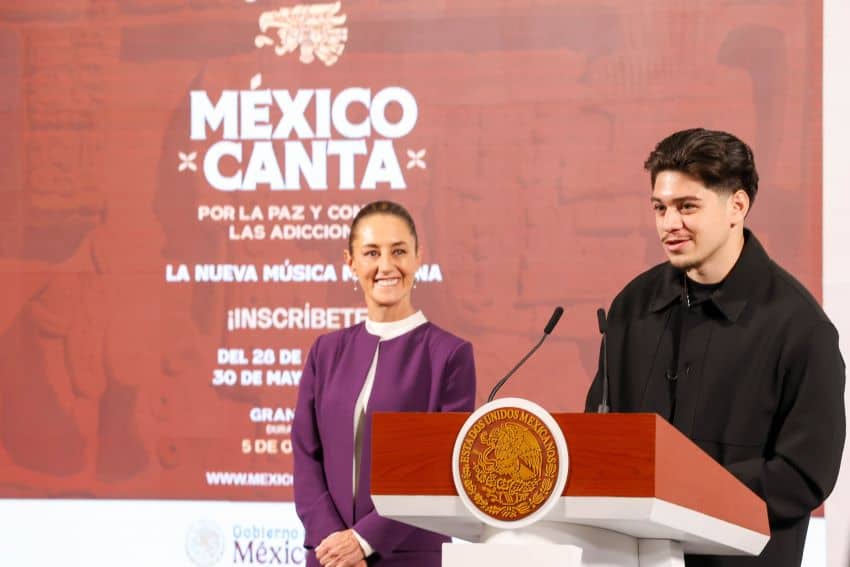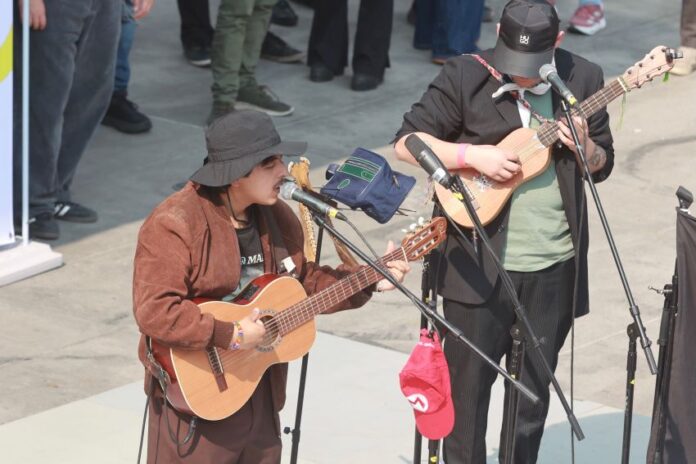Five months after saying popular Mexican music must stop glorifying crime, violence and misogyny, President Claudia Sheinbaum this week launched a singing contest that aims to do just that.
Move aside “American Idol.” Here comes México Canta, a binational music competition aimed at fostering creativity among young people while addressing social challenges such as addiction and violence.

Part of the Sheinbaum administration’s Plan México, the initiative seeks to promote traditional Mexican music — such as corridos, mariachi and ranchera — without lyrics that glorify violence and/or drugs.
Another aim is to bring elements of the U.S. music industry to Mexico.
The full name of the program is México Canta (Mexico Sings): For Peace and Against Addictions, and it’s open to performers and composers aged 18 to 34 from Mexico and the United States.
Registration will begin April 28 and end May 30, after which a Mexican Music Council jury will select 10 competitors from each Mexican state and 15 from each of three U.S. regions (West, Central and East).
Through live performances in cities such as Chicago, Los Angeles, Tijuana and Oaxaca, those 365 competitors will be whittled down to 48 finalists — eight from each of the U.S. regions and eight from each of three Mexico regions: North, South and Central.
The grand finale is set for Oct. 5 in the northwest state of Durango.
During her Monday morning press conference, Sheinbaum said the singing competition aims to help young people create identities linked to art, culture, sports, education and employment — rather than through music that condones violence and crime.
Furthermore, there’s a goal to establish choirs in all Mexican public schools.
La música tiene un papel fundamental en la transformación cultural de nuestro país. #MéxicoCanta es una convocatoria para fomentar la composición de canciones que se alejen de la violencia y recuperen la fuerza narrativa de la música mexicana, inspiradas en el amor, la historia,… pic.twitter.com/EozOWMA9N3
— Secretaría de Cultura (@cultura_mx) April 8, 2025
“We are changing the reality of young people by giving them … a different narrative,” Sheinbaum stated in a Culture Ministry press release. “I’ve always said this about the false idea that joining a criminal group is a life choice: It’s not a life choice. It’s a death choice.”
Sheinbaum said the singing and composing competition, which will be broadcast on public media in Mexico, includes the U.S. for two reasons, one of which is “the promotion of Mexican music on both sides of the border.”
Another is an economic tenet of Plan México: “To bring part of the creative industry that exists in the U.S. to our country … [the music industry] generates many jobs in the U.S. — and we want much of that to come to our country, as well.”
Participants in the contest are invited to showcase traditional genres such as mariachi, norteño, banda and bolero, or explore contemporary Mexican fusions with rap, rock, pop and hip-hop. Submissions in Indigenous languages are encouraged.
Registration will open later this month at mexicocanta.gob.mx.
Composers must submit an original three-minute song, while performers can submit a three-minute excerpt of any song fitting the competition’s profile.
México Canta, which is being promoted by the Culture Ministry in collaboration with the Mexican Music Council (CMM) and the private sector, has been praised by industry leaders.
CMM director Miguel Ángel Trujillo called the singing contest “historic;” Guillermo González, the general director of the Mexican Association of Phonogram Producers, said Mexico is one of the best bets in the global music industry and is therefore primed for outside investment; and singer-songwriter Horacio Palencia lauded the program’s focus on combating violence through music.
Peso Pluma and narcocorridos – good, bad, or simply a reality society doesn’t want to face?
In recent years, a new crop of Mexican artists, such as Peso Pluma, have taken traditional forms of Mexican music and turned them into “narcocorridos” or “drug ballads.” These songs condone the lives of criminals in the drug trafficking trade in Mexico, or “narcos.”
Culture Minister Claudia Curiel de Icaza said that while Mexico ranks 10th in the global music industry market and eighth in digital consumption, more than 70% of Latin music is corridos, many of them “narcocorridos.”
With reports from Excélsior, Contra Línea and Sin Embargo
